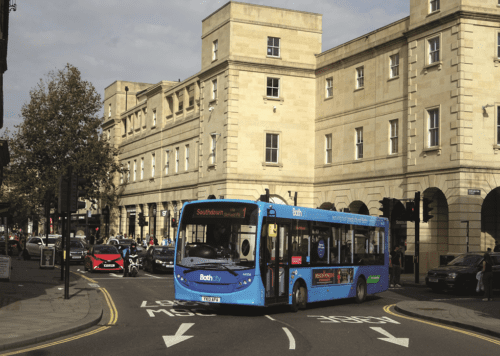
A number of local authorities have pledged to continue to cap fares at a lower rate once the English bus fare cap raises to £3 from 1 January 2025
A proposal from Cambridgeshire & Peterborough Mayor Nik Johnson to maintain a £2 cap for bus fares in the region until the end of March was approved at an extraordinary meeting of the Combined Authority Board on 13 December.
The Mayor called the meeting to explore how local funding could further support affordable journeys. He said: “The Government took an important step in supporting bus users by putting a £3 fare cap in place to the end of 2025. But as a Combined Authority, we also had the ability to act. Keeping fares as low as possible for our residents maintains our commitment to better buses, helping people get to places of work, education and leisure more affordably, and encouraging people to choose public transport.”
The Mayor said that retaining the £2 fare will support the Combined Authority’s Bus Strategy by encouraging public transport use, increasing passenger numbers, and providing a cost-effective alternative to car travel. The estimated cost to keep fares at £2 for a further three months is around £1 million, the Combined Authority estimates, funded through its 2024/25 Bus Service Improvement Plan (BSIP) grant from the Government.
The Combined Authority says it will work now with bus operators to ensure the £2 fare cap remains in place. The Authority said that decisions about any extension to the cap beyond March 2025 will be made as part of its budget and medium-term financial plan-setting process in early 2025.

North East cap
Adult bus fares in the Nexus area in the North East have been capped at a maximum of £2.50 from January, with fares in the region expected to range from £1.90 to £2.50 for a single journey. The region’s £1 flat fare for passengers aged 21 and under across public transport is also retained in 2025, says Nexus, with the ambition that this stays in place across the region until 2028.
The new fare cap is being subsidised by the North East Combined Authority and was announced by North East Mayor Kim McGuinness. The Mayor said: “I am determined to deliver a green, integrated transport network that works for all – and a huge part of that is making fares cheaper every day to help local people to travel by public transport to college, to their place of work and other opportunities. I am committed to make public transport much more affordable and I can confirm I will cap all adult single bus fares in the North East at a maximum of £2.50 from January 2025, saving passengers at least 50p for each and every journey. This is a huge achievement, and I’m pleased to fund this new cap to keep travel costs as low as they can be.
“These fares will support local people, helping families across the region save money on transport costs and keep more money in their pocket. I am determined to tackle child poverty and every decision I take is with this firmly in my mind. We have also encouraged local operators to keep fares low generally, and operators will set their prices for shorter journeys below the cap which are expected to range from £1.90 to £2.50 to further support residents.”
Cllr Martin Gannon, Lead Member for Transport and Leader of Gateshead Council, added: “The Mayor and cabinet have set out to massively improve our bus travel and this is another determined move to make every day public transport use more appealing and affordable for residents. I wholeheartedly support the delivery of the new regional bus fare cap – ensuring no single bus fare in the North East next year will be more than £2.50. This will help us boost the number of people using the bus while making it cheaper. This is in the best interest of local people.”
£2.40 in Bristol and Bath
Most bus fares in Bristol and Bath will be capped at £2.40 from 1 January as well as for passengers across the region taking a journey that is under six miles in length. The new maximum fare is part of a plan by Mayor of the West of England Dan Norris, in partnership with First Bus.
The Mayor said: “Keeping fares as affordable as possible for local people is crucial for our regional economy and the environment. This agreement will mean cheaper fares than the national average and a good deal for people living in more remote areas.
“Meanwhile we are continuing to get on with encouraging tens of thousands of new passengers onto our buses through Birthday Buses scheme, as a key way to grow a sustainable bus network.”

